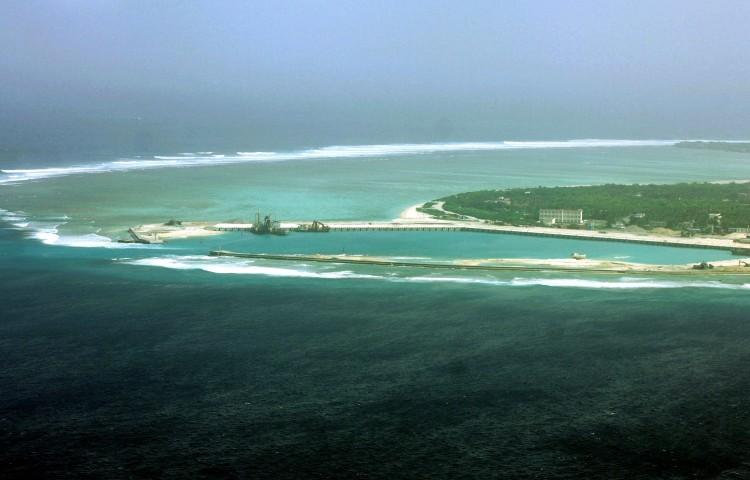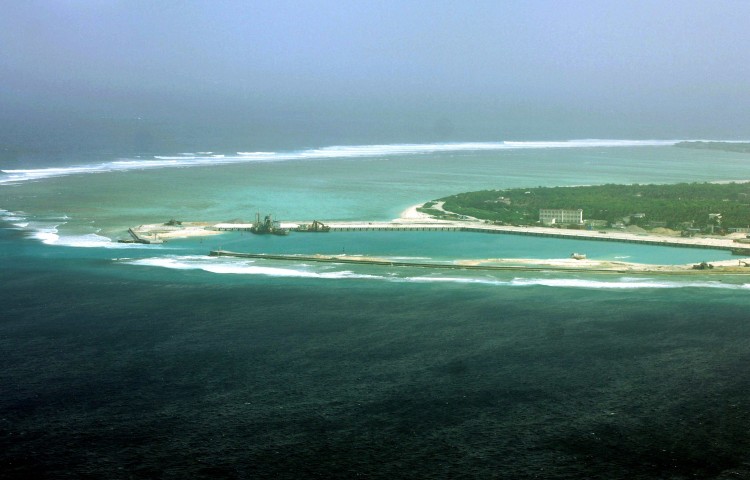WASHINGTON—The United States says China’s increasingly aggressive territorial claims in the South China Sea are escalating tensions in the region, and called for a rules-based approach to resolving territorial disputes.
Patrick Ventrell, a spokesman for the U.S. State Department, said rising tensions in the South China Sea were concerning, and noted particularly China’s confrontational approach in dealing with territorial and maritime disputes, in a statement on Aug. 3.
“Recent developments include an uptick in confrontational rhetoric, disagreements over resource exploitation, coercive economic actions and incidents around Scarborough Reef, including the use of barriers to deny access,” the statement continued
Philippine Defense Secretary Voltaire Gazmin reported last week that Chinese fishermen had blocked the mouth of the Scarborough Reef lagoon, using buoys and ropes to prevent other fishermen from entering.
Scarborough Reef, which is claimed by the Philippines, China and Taiwan, lies adjacent to maritime trade routes, and stands around one hundred miles from the main Philippine island of Luzon. The nearest recognized Chinese territory is about 400 miles to the west.
The U.S. statement also referred to China’s most recent city, Sansha City, on a tiny island in the Paracel islands. The Paracel archipelago, approximately equidistant from the Vietnam and China coastlines, is also claimed by Vietnam.
Launched as an administrative center for the surrounding region with much fanfare on July 24, Sansha City has been designated a garrison by the Chinese military.
The U.S. State Department said these developments “run counter to collaborative diplomatic efforts to resolve differences and risk further escalating tensions in the region.”
Both Vietnam and the Philippines have lodged a diplomatic protest against Sansha City.
U.S. Senator John McCain issued a statement July 24, calling China’s move “unnecessarily provocative” and said such actions only reinforced concerns raised by other countries in the region about China’s “expansive territorial claims.”
Ventrell reiterated the U.S. position of neutrality in the territorial disputes, adding “we believe nations in the region should work collaboratively and diplomatically to resolve disputes without coercion, without intimidation, without threats and without the use of force.”
The Chinese regime, through Foreign Ministry spokesperson Qin Gang, issued a typical response, saying that the United States had “completely ignored the facts” and sent a “seriously wrong signal” by asking China to abide by international law in pursuing its maritime ambitions.
Rules-based Approach
The U.S. statement urges parties to use international laws to resolve territorial disputes, including the UN Law of the Sea (UNCLOS).
Vietnam’s National Assembly passed a maritime law to claim sovereignty of both the Paracel and the Spratly Islands in June this year. The status of the Spratly Islands is disputed by China, Taiwan, the Philippines, Brunei, and Malaysia.
Carl Baker, a security analyst for Washington-based think tank, the Center for Strategic and International Studies (CSIS), said the U.S. statement re-affirms America’s position in emphasizing existing international norms.
Speaking by phone from his base in Honolulu, Baker says regional architecture like ASEAN (the Association of South East Asian Nations) does not, to date, have the teeth to resolve territorial disputes, but UNCLOS, which delineates maritime territory by its proximity to a country’s land base, does.
“It is the best chance to resolve it in a way that satisfies everyone,” he said.
If countries do not opt for a rules-based approach, it leaves the door open for bullying, he said.
“If you don’t do that, it is basically a power play by China,” Baker said. “Establishing the administrative district Sansha is certainly a step in that direction.”
The Epoch Times publishes in 35 countries and in 19 languages. Subscribe to our e-newsletter.





